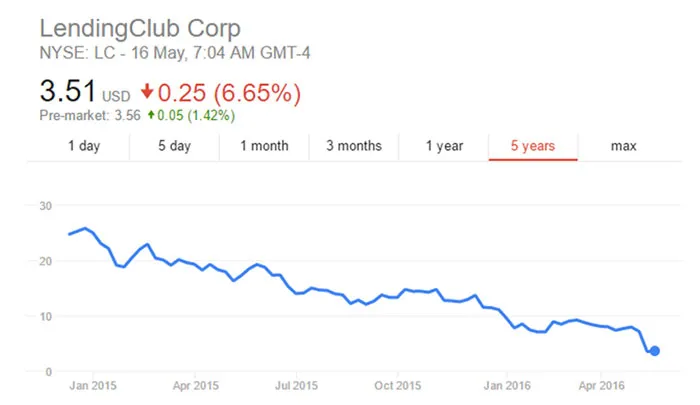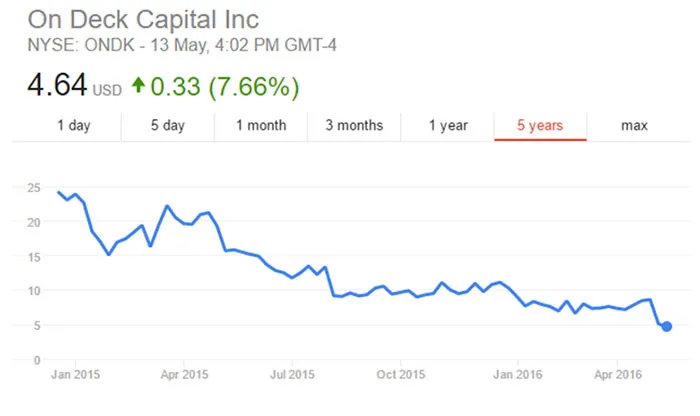Is there a crisis in the alternate lending Fintech Industry?
While the Indian startup ecosystem was celebrating the news of Capital Float raising $25 million in a Series-B round and the Fintech world expecting bigger and better news in the days to come, elsewhere, the Alternate Lending (read P2P lending to be more precise) Industry was witnessing harsh times, probably its worst fortnight. Let’s start by looking at some of the recent happenings:

- LendingClub Founder Renaud Laplanche resigns – Cirrix Capital is a fund that buys LendingClub loans and borrows money from other banks to fund a part of its purchase. LendingClub was considering investing in Cirrix Capital, which would have created a virtuous cycle. Renaud Laplanche failed to disclose his personal investments in Cirrix Capital as part of this process, which was recently found during the internal review of loan sales, forcing the much celebrated founder of the most admired company of the P2P revolution to resign.
- LendingClub shares plummet, down to an all-time low of $3.54 per share – The LC stock has not seen many positive days since its IPO (around 18 months back). However, the latest scandal related to Jeffries was more than a nail in the coffin. LendingClub changed the dates on many loan applications, to make it appear that they came after a disclosure that they introduced for Jeffries to buy their loans worth $22 million. The disclosure mentioned that LendingClub can access customer financial information and even sign the promissory note on their behalf. Their share price performance snapshot is as below:

- Prosper shuts down Salt Lake City office, lays off 170 people – After disappointing earnings announcement, Prosper let go of nearly 28 per cent of their workforce and shut down their Salt Lake City office. No one from the risk or underwriting teams was let go but the downsizing was done to “right-size the company for their levels of business,” as per company spokesperson. There is also a rumor that Prosper may soon shut down its healthcare line of business – Prosper Healthcare.
- On Deck shares at an all-time low of $4.64 per share – Online lending giant OnDeck’s shares dropped nearly 34 per cent in midday trading in early May this year. This came on the backdrop of an earnings miss and downgrading of the stock by analysts. Loan sales are reported to have dropped and the key problem being that the operating and acquisition costs are outpacing its growth in revenue. Their share performance snapshot is as below:

These are not just news clippings regarding the top alternate lending companies in the US (and potentially across the world), but they are shock-waves which could lead to drying up of investor money across all such platforms – both equity capital and lending capital which helps in securitisation of loans. Private Equity funds and Hedge Funds are typical investors on platforms like LendingClub and Prosper, and with these already showing signs of caution, platforms would need to look for a longer term source of capital for selling loans, and inability to do so may result in higher rates being passed on to the borrowers or a drop in loan originations.
Two key questions arise:
- Is this a market adjustment or are we close to another cycle of financial crisis?
- Does this have any impact on the Indian Fin-tech Industry which is clearly and slowly trying to mirror the US?
The answer to both the above questions is linked to the theory – there is a life cycle that every industry goes through. The US Alternate Lending Industry is going through the same life cycle. This life cycle has now reached the stagnation point. The Indian Fintech Industry is following a much slower and less steep growth curve. The result being that the impact, though might be felt in investor confidence coming in slow and steady, but would not hurt the players who are coming out with the regulatory and legal aspects in place, have a solid understanding of Credit Underwriting in the Indian context and are using technology to drive value and improve processes, not just in Underwriting, but also across Operations, Acquisitions and Collections.
Concerns are already being raised about the technology-driven underwriting for unsecured loans in times when the unemployment rates could rise and credit may deteriorate. Only time will tell whether the market leader and the face of the Alternate Lending Fin-Tech world has triggered another financial crisis or whether it is just another passing phase. But one thing clearly stands out – companies having skin-in-the-game, doing originations on their balance sheet, or following a hybrid model like Avant, which, as per the CEO Al Goldstein, is the only cash-flow positive company because of the yields they make on loans they originate on their own balance sheet, are going to be relatively unaffected compared to the pure P2P players.
(Disclaimer: The views and opinions expressed in this article are those of the author and do not necessarily reflect the views of YourStory.)







